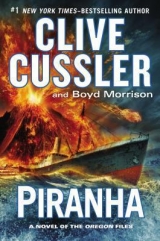
Текст книги "Piranha"
Автор книги: Clive Cussler
Жанр:
Политические детективы
сообщить о нарушении
Текущая страница: 6 (всего у книги 25 страниц)

MacD Lawless clung to the port side of the Sorocaima in defiance of gravity like Spider-Man. Mike Trono was next to him, suspended twenty feet above the water. Linda Ross maintained her position on the Discovery, her face visible through the front window as she craned her neck up to watch them.
The tanker’s hull was sitting low in the water with her holds full of diesel, but climbing the bare steel still presented a challenge. Not that MacD wasn’t up to it. Taking on a demanding mission like this was one of the reasons he’d joined the Corporation in the first place.
He disengaged the electromagnetic handhold in his left hand and moved it up a foot, placing the rubberized flat side against the hull before reengaging it. The magnet, a smaller version of the one built into the beatbox still attached to the underside of the Sorocaima, adhered to the metal with enough force to support four times MacD’s body weight. Shoes with high-friction toes allowed him and Mike to brace their feet against the side.
When they reached the lip of the deck, MacD nodded to Mike and they slowly lifted their heads to scan the area for any of the crew. A quick but careful look revealed no one in the vicinity. And since they were directly below the bridge’s flying wing, no one stationed inside would be able to spot them unless they happened to look straight down over the railing.
The original plan was for MacD and Mike to access the holds via the emergency vents atop the deck, injecting the bacteria-laden vapor into each tank one by one. But once they had discovered that all of the tanker’s lights were on, it was clear they would almost certainly be spotted from the bridge with that approach, and there was discussion of aborting the mission entirely. However, Linda pointed out that they wouldn’t get this opportunity again and MacD and Mike had agreed.
They brainstormed alternatives for five minutes before Linda suggested a solution that had previously been rejected in the planning stages.
She told MacD and Mike that modern tankers used residual gas from the boiler flue to replace the air that was left in the storage tanks. The oxygen-deprived exhaust was inert, eliminating the chance that a spark could ignite the fuel vapor inside the tank.
A quick review of the Sorocaima’s schematics confirmed that the tanker was equipped with just such a system. If they could get to the purge controls inside the pump room, they could inject the Corrodium bacteria into all six holds at once.
With the deck still clear, MacD nodded to Mike and they hopped over the railing, leaving their magnets attached to the hull out of sight. The handles had enough battery power to last two hours, so it was simpler to leave them in place for a quick escape.
They pressed themselves flat against the outer wall of the superstructure next to the door leading inside. MacD felt naked in the bright light, and seeing Mike didn’t boost his confidence. Clad in black from head to toe, including a greasepaint-covered face and a black backpack containing three canisters of the Corrodium, Mike might as well have had the word “Intruder” emblazoned on his shirt. MacD was dressed identically. Their only chance at remaining undetected was to stay quiet and out of anyone’s sight.
Neither of them had to refer to a map. They had memorized the route inside the ship that would present the least chance of them being discovered. Once at the pump room, Linda would talk them through the process for injecting the canisters’ contents into the air purge system. She would be able to follow their progress via head-mounted cameras and microphones and communicate with them through their earpieces.
He nodded to Mike, who eased the door open. They didn’t have their sidearms at the ready. Gunfire would raise all kinds of alarms. If it came to a confrontation, their hand-to-hand combat skills would be more than a match for any crew member, and the crew on a tanker like this would be unlikely to carry any weapons.
MacD poked his head in and saw an empty corridor. With only twenty crew on board the Sorocaima, he hoped most of them would currently either be on the bridge or in the engine room, attending to the supposed malfunction. Of course, a crewman could pop out of a random door at any time, ruining everybody’s night. The way MacD figured it, this mission was going to be at least fifty percent luck.
He and Mike crept along the corridor, using only hand signals to communicate. The path to the pump room was straightforward: the third door on the right was a stairwell, then it was four decks down to a hall leading directly to the room.
They reached the third door. MacD heard footsteps clanking up the metal stairs. He gestured to a utility room across the hallway. With no time to check if it was clear, they ducked inside. To MacD’s relief, it turned out to be empty, and they got the door closed just as the stairwell door banged open. They listened as footfalls trudged down the hallway until the outer door slammed open and then closed. Silence descended.
“I hope we didn’t use up all our luck on that one,” Mike said.
“My daddy always said, ‘Luck never gives, it lends,’” MacD replied. “Let’s get this done before we have to pay it back.”
“Amen, brother.”
MacD pushed the door open and they stole across the hall. They didn’t run into anyone else before they reached the door of the pump room. There was too much ambient noise on the opposite side of the door to be sure that the room was empty.
He cracked the door and, from his limited viewpoint, saw no one. He was tempted to continue inside slowly, but two voices somewhere behind them speaking Spanish made time a luxury. Even if the men simply passed by, he and Mike would surely be seen.
They moved through the door and immediately realized their luck was about to run out. Linda mumbled a curse in their ears because she could see the same thing they saw.
Two crewmen were hunched over a display, both with their backs to the door. Neither of them had heard MacD and Mike enter, and Mike, realizing that the door was closing quickly enough to be heard over the background noise, jammed his hand between the door and jamb to keep it from making a sound. He grimaced in pain but stayed silent. MacD moved the door enough for Mike to pull his hand away and then eased the door latch closed with nary a scrape of metal. MacD silently thanked the crew for being diligent enough to keep all of the hinges well oiled.
The two crewmen still hadn’t noticed them, but one turn of the head and their presence would be known. They were only twenty feet from the purge valve that MacD and Mike needed to access. There was no way to reach it without being seen. Knocking them out wasn’t the answer because it would reveal that intruders were on board.
They retreated behind a vertical pipe as big around as an oak tree and kept an eye on the two men from their hidden vantage point. All they could do now was wait and hope the crewmen would go on to other tasks in another part of the ship.
Five minutes went by. Then six. Then seven. The crewmen didn’t budge.
“This isn’t working,” Linda whispered, knowing they couldn’t respond. “If we wait any longer, the ship will get under way before you can do the job. Let’s see if we can get them out of there.”
Three loud bangs reverberated through the hull. Linda had reactivated the beatbox.
The crewmen’s heads snapped up and twirled around, looking for the source of the noise. One of them raised a walkie-talkie and fired off rapid Spanish, shrugging and pointing to the display as he spoke. Whatever the problem was, it obviously wasn’t in the pumping system because they had been monitoring it when the bangs were heard.
The crewman lowered his walkie-talkie and gestured for the other man to follow him out of the room. The door slammed shut behind them, leaving MacD and Mike alone.
“How did you know that would work?” MacD asked as they dashed over to the gas purge controls.
“I didn’t,” Linda replied, “but it was the only thing we had. They’re probably certain the problem is in the engine room now.”
Mike, who couldn’t hold anything with his injured right hand, removed the canisters from his pack with his left. “What if the captain decides to turn back?”
“That’s a chance I had to take. Unless his gauges are telling him something else, we’ll hope that he’ll assume the noise is incidental and report it to the maintenance crew when he arrives at his destination.”
While Mike stood watch at the door, Linda talked MacD through the injection process. With her guidance, he attached each of the six canisters to the valve junction in sequence and in five minutes the Corrodium bacteria was multiplying inside the Sorocaima’s holds.
Like campers in a national park, they planned to leave no trace. MacD checked the work area to make sure it was clean and started putting the canisters back into their packs.
Before he was finished, he felt a vibration thrum through the floor.
“Is that you?” he asked Linda.
“Negative. They’ve engaged the engine. The tanker is getting under way. Get out of there now!”
MacD, with the shortened deadline, couldn’t argue with that order. He jammed the last of the canisters into the pack and handed it to Mike, who put it on.
They retraced their way out. When they got to the main deck corridor and reached the end of the hall, three men were outside, smoking cigarettes and talking, apparently happy that they were on course again.
“Hurry up,” Linda said. “You’re already up to five knots. I won’t be able to keep up with you much longer.”
“We can’t reach our climbing equipment,” MacD said to her. “The port exit’s blocked.”
“I don’t think we can wait them out this time,” Mike said. He pointed at the other end of the corridor leading out to the starboard side of the ship. “How do you feel like going for a swim?”
MacD shrugged. “Why not?”
They sprinted down the hall, expecting at any moment to see a crewman emerge from a door right in front of them. When they got to the end of the corridor, MacD checked the door. It was clear.
Outside, the wind whipped across the deck as the tanker gained speed.
“Linda, we’re about to take a dip on the starboard side,” MacD said, knowing that their electronics would be fried as soon as they hit the water. “We sure would appreciate you coming on over and picking us up when you get a chance.”
“Roger that,” she replied. “I’m on my way.”
With one last look to make sure they were alone, MacD and Mike climbed onto the rail. They launched themselves forward, competing to see who could make the better swan dive. Although they entered the water with splashes, MacD was sure that nobody on the tanker would have noticed in the darkness.
MacD surfaced and bobbed in the Sorocaima’s wake as it churned toward its destination in North Korea. Mike paddled beside him.
“How’s the hand?” MacD asked him.
“Nothing an ice bucket won’t cure,” Mike replied.
In three minutes, with the tanker far in the distance, the Discovery broke the surface and Linda stuck her head out of the hatch.
“You look like you both made it through just fine,” she said with a smile, “but I give you only a three on the dives. Let’s see a gainer or a twist next time.”
MacD turned to Mike and said, “Everyone’s a critic.”
“Especially a squid.”
Like swabbie, squid was a nickname the other services used for a member of the Navy.
“Keep calling me that,” Linda said, “and I might just leave you both behind.”
In another minute, they were on the sub, with towels and coffee in hand, to begin the wait for the Oregon to return and pick them up.
The beatbox, now detached from the Sorocaima and with its tube deflated, was drifting to the bottom of the Caribbean. The only items they’d left behind were the climbing magnets still stuck to the side of the ship. Once the batteries discharged, however, they would fall away, disposing of the last evidence that any intruders had ever been aboard.

Juan Cabrillo grinned when he spotted the ill-advised roadblock ahead. Two tractor-trailers had been stretched across the far end of a bridge leading to the peninsula where Juan intended to rendezvous with the Oregon. Two Humvees with armed soldiers waited with the trucks, and three more Humvees trailed the tank, their occupants taking the occasional ineffective potshot.
Not wanting to reveal their final destination, Juan and Linc had led their pursuers on a stop-and-go chase around the city while Max got the Oregon in position. Max had just radioed that they were ready, so they were on the way to their hilltop objective.
“You see it?” Juan said into his headset.
“Unless those trailers are filled with lead,” Franklin Lincoln replied from the driver’s seat, “I think they’re underestimating what a sixty-five-ton tank can do.”
“Why don’t you go ahead and show them?”
“My pleasure.”
Linc gunned the Abrams up to its governed top speed of forty miles an hour. The tank bolted across the bridge, an implacable juggernaut charging toward what the Venezuelans must have thought were immovable objects.
Juan knew how wrong they were.
The Abrams plowed through the trucks like a linebacker tearing through a paper banner before a football game. Juan felt the tank barely slow as the empty trucks were pulverized, showering the nearby soldiers with metal shards.
Juan turned to see the Humvees crawling through the wreckage to continue the chase as the tank made its way down the shoreline road. He checked the fuel level. They were getting dangerously close to empty, and they still had two miles to go. If they ran out of gas in the middle of the road, the Venezuelans would be able to call in bigger weapons and either wait them out or blow the tank up. They’d be as good as dead.
Juan’s escape plan depended on having a few minutes outside the tank undisturbed. If they were surrounded by soldiers with rifles when they reached the top of the hill on the peninsula, they’d be shot as soon as they opened the hatches.
That meant slowing down their pursuers, and the power lines strung along the edge of the roadway gave Juan an idea.
“Linc, I think there’s going to be a blackout on this side of the harbor pretty soon.”
Without hesitation, Linc answered, “Yes, those telephone poles look very unstable. They should be replaced. I’ll help them with the demolition.”
Linc swerved off to the side of the road and aimed for the nearest thick wooden pole. The Abrams snapped it like a twig and it fell across the road, its power line sparking on the asphalt. The streetlights were immediately snuffed out, leaving only the illumination from the tank.
The Abrams continued along the roadside until they’d knocked over half a dozen poles.
“Nice driving,” Juan said. “That should give us at least a few minutes’ breathing room while they try to get those Humvees around them.” With no parallel street and rocky terrain behind the houses lining the road on one side and water on the other, the soldiers would have no choice but to clear the obstacles before they could resume the pursuit.
The rumble of the tank’s treads had brought out residents from their homes. The astonished onlookers made Juan feel like they were cruising down the street inside a parade float.
When they got to the end of the road, Juan used his phone’s GPS to guide them up the bushy slope. The Abrams faltered briefly as its treads tore at the dirt for purchase and then climbed the hill, flattening shrubs and small trees along the way.
In two minutes they had reached the apex of the hill, where in the daytime they would have had an expansive view of the Caribbean. The cloud cover obscured the full moon, making it impossible to see the archipelago of small islands three miles away that formed a natural breakwater protecting Puerto La Cruz and La Guanta from storms.
But Juan could make out the lights on the stationary Oregon far below them, three hundred yards north of the rocky coastline. Max had put the ship exactly where Juan was expecting to see her.
Juan popped open the hatch and climbed out of the tank, glad to get a breath of fresh air after being saturated with the stench of burned gunpowder. Linc cracked his hatch and pulled himself up. He stretched his beefy arms wide.
“That space was definitely not designed for someone like me,” he said.
“Is anything designed for someone like you?” Juan said as he phoned the Oregon.
Linc shook his head. “Why do you think my Harley is customized?”
Juan’s phone clicked and Max came on the line. “So that’s your Plan C, huh?”
“We like to travel in style,” Juan replied. “Are you ready to fire?”
“Eddie’s on deck with the Comet and has you in his sights.”
“Then let her rip.”
Comet was a company that designed line-throwing rockets required on ships by the Safety of Life at Sea convention, or SOLAS. They were used as fire safety lines to people who’d fallen overboard, and they could also send lines to other ships for passing back towlines or supplies.
Comet’s normal product fired rockets with a range of two hundred and fifty yards, but the Corporation had asked them to double that range.
Juan spotted a flash from the Oregon and a red teardrop of flame flew at them. Eddie’s aim was dead-on. The torch arced high over their heads and down the other side of the hill. The rope line landed right across the tank’s turret.
Linc wasted no time knotting it around the Abrams’s gun barrel to anchor it. He gave Juan the thumbs-up when it was tight.
“Tell Eddie that he was right on the money,” Juan said to Max. “We’ve got the line hooked up.”
“We’ll get it tied onto a crane at our end.”
The rope line went taut as Eddie reeled it in. The Oregon’s thrusters would keep the ship in place so that the line wouldn’t go slack or snap.
Juan motioned for Linc to go first. Linc climbed onto the tank, wrapped the strap from the assault rifle around the rope, and looped each end around his wrists.
“Remember,” Juan said, “we’re a lot higher than the Oregon, so you’re going to have a good head of steam when you get there.” Eddie had half inflated a couple of rafts to cushion their landing, but it would still feel like a wrestler’s body slam. Juan let Max know that Linc was on his way.
Linc nodded and stepped off the Abrams’s front end. Zip lines for tourists are made of heavy steel cable so they will remain taut under load, but the nylon line had much more flex to it and sagged under his weight. He walked down the hill until he was suspended from the rope and gravity took over.
Juan’s eyes were drawn away from Linc’s progress when he heard the sound of vehicle engines. Headlights came to a stop at the end of the road several hundred yards away. Doors slammed as soldiers piled out and scrambled up the hill. It would be simple to follow the trail of destruction the tank had left in its wake.
Flashlights bobbed as the soldiers climbed. Officers shouted orders to take them alive, but Juan guessed those orders would be countermanded if they saw he was about to get away.
Max called to tell him that Linc had made it, and not a moment too soon. The clouds had parted momentarily, revealing the tank’s silhouette in the moonlight. The soldiers had spotted the Abrams and were sprinting toward it, their rifles at the ready.
Juan repeated Linc’s actions. When he was set, he jumped off the tank and ran forward. His arms extended until his feet came off the ground and he was sliding down. Wind buffeted his hair, and the smell of salt water grew stronger as he neared the coastline.
Gunfire erupted behind him but was quickly snuffed out. Juan thought he knew why, but he couldn’t turn his head far enough to verify it.
They must have seen him flying through the air, puzzled as to how he was doing it, and snapped off some shots. Then some perceptive soldier had to have realized what he was doing and the race was on to find the line he was using. It would only be a matter of seconds before they realized it was attached to the Abrams.
Juan was still more than a hundred yards from the Oregon, but past the waves crashing against the rocks jutting from the surf. A vibration in the rope told him the soldiers had found it and were trying to shake him off. The next step was obvious.
The line suddenly went slack on the hilltop end, the victim of a sharp knife, sending Juan hurtling toward the sea. He straightened his body and entered the water feetfirst.
He plunged ten feet down. Before he released the rifle strap, he grabbed the rope and kicked toward the surface.
He breached the water and the line went taut again. Juan tightened his grip as he was reeled toward the Oregon. He could hear shots coming from the soldiers again, but at this distance in the darkness they might as well have saved the ammo.
The side of the Oregon loomed over him and a rope ladder was tossed over the side. Juan swam to it and climbed to the deck. Eddie and Linc pulled him up and Juan landed on his feet.
“Thanks,” Juan said. “I wasn’t planning to make that a water landing.”
“The guys at the yacht club will never believe what I reeled in,” Linc said with a smile.
“Good to see you again, Mr. Gao,” Juan said to Eddie.
Eddie bowed his head an inch in response. “Captain Holland.”
“Tell Max to get under way and that Plan C worked without a hitch. I’ll meet him in the op center after I dry off.”
As they walked, Eddie relayed Juan’s command on his headset radio. A moment later, the Oregon began to turn away from the coast.
Eddie’s face suddenly took on a more serious expression.
“What is it?” Juan asked.
“Max says we’ve just been hailed by a Venezuelan frigate twenty miles due west. Their captain is ordering us to surrender or be destroyed.”








